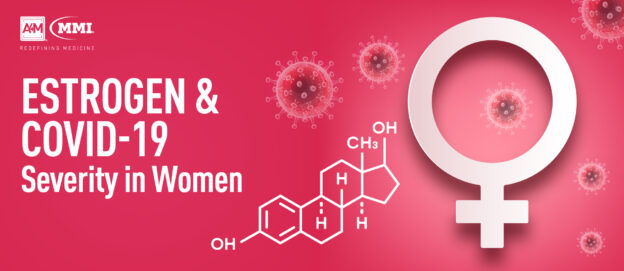Growing clinical evidence reveals that the intensity of COVID-19 infection and incidence of related complications are more prominent in male patients. Current data suggests that men experience a greater risk than women for more severe COVID-19 symptoms and poorer outcomes regardless of their age. These burgeoning findings signal that sex may function as a determinant of COVID-19 infection severity.
While the body of evidence examining sex differences in virus outcomes is lacking, researchers believe the functional modulation of angiotensin-converting enzyme 2 by estrogen may explain disparities in morbidity and mortality. Further reasons for higher male sex-specific COVID-19-related mortality are likely multi-fold and may include lifestyle differences such as higher rates of tobacco smoking and alcohol consumption as well as innate immunity. The mounting evidence suggesting sex-based differences in clinical outcomes emphasizes the need for an assessment of sex-specific hormone activity – in particular, estrogen – in COVID-19 pathogenesis.
Sex-Specific Differences in COVID-19 Outcomes
A recent study conducted by researchers at the Wake Forest Baptist Medical Center attempts to elucidate the mechanisms underlying these notable differences. Led by Leanne Groban, MD, professor of anesthesiology at Wake Forest School of Medicine, a team of researchers conducted a review of published literature to determine whether sex plays a role in COVID-19 outcomes by examining pre-clinical data on sex-specific hormone activity.
Beneficial Impact of Estrogen
The study’s authors reported that angiotensin-converting enzyme 2 – attached to cell membranes in heart, arteries, kidneys, and intestines – acts as a cellular receptor of the coronavirus responsible for COVID-19 infections and helps the virus gain access to cells of those organ systems. According to the researchers, their review also pointed to estrogen’s impact on ACE2 levels in the heart; the hormone lowered ACE2 levels. This may modulate the severity of COVID-19 in women, while higher levels of ACE2 present in tissues could account for why the disease presents worse in men.
“We know that coronavirus affects the heart and we know that estrogen is protective against cardiovascular disease in women, so the most likely explanation seemed to be hormonal differences between the sexes,” said the lead author of the review, Dr. Groban told ScienceDaily in an interview.
“We hope that our review regarding the role of estrogenic hormones in ACE2 expression and regulation may explain the gender differences in COVID-19 infection and outcomes and serve as a guide for current treatment and the development of new therapies,” Groban said.
An enhanced understanding of the role of estrogenic hormones in ACE2 expression and regulation may not only help uncover potential mechanisms that explain sex differences in COVID-19 clinical outcomes, but also guide future disease management techniques and spur the discovery of novel therapeutic methods.

